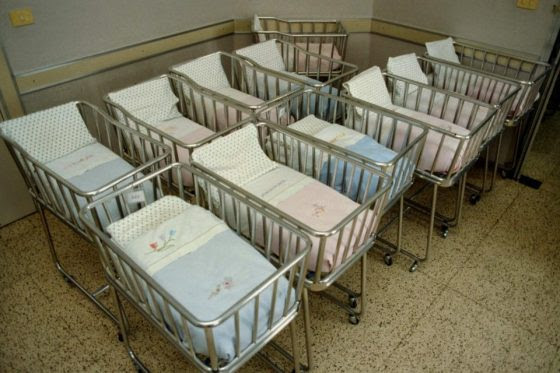Germania . Assistenza agli anziani : quasi 40.000 posti vacanti, ma ...
Giuseppe Sandro Mela.
2018-05-09.

«The Dutch population, like in many western societies, is aging. The number of elderly with dementia is expected to rise by 60 percent in the next 15 years, according to the Dutch Central Statistics Office. An equivalent rise in professional caregivers is not expected»
*
*
Non passa giorno senza che una qualche Autorità tedesca denunci la carenza degli organici attuali, carenza che sinistramente appare essere sempre più severa ogni giorno che passa.
Come durante la fase finale della seconda guerra mondiale i tedeschi si illudevano che le 'armi segrete' avrebbero risolto il conflitto, adesso vivono l'allucinazione che immigrazione e robot potranno risolvere la loro crisi demografica.
Ma proprio come negli ultimi anni della guerra mandarono al fronte i vecchietti del Volkssturm, così ora i tedeschi iniziano ad esperire in corpore vili una disperata carenza di giovani. Arruolarono anche polacchi e gente di altre nazioni, per poi stupirsi della loro nulla volontà guerriera: non ne volevano sapere di morire per la Grande Germania. La differenza tra un carro armato costruito da maestranze specializzate tedesche oppure assemblato da deportati ai lavori forzati era quella che passava tra un quadro del Caravaggio ed il disegnino di un bimbo: si sfacevano strada facendo, semplificando di molto il compito degli Alleati.
*
I robot in grado di svolgere lavori proficui non in una catena di montaggio sono al momento una allucinazione. Non esiste negozio ove andare e comprare un robot che sappia riparare un impianto elettrico oppure un rubinetto che goccia. Per non parlare poi di saper cucinare oppure servire in tavola. Di assistenza gli anziani manco a parlarne.
Magari i nostri post nipoti ne disporranno: noi, ora, qui, non ne abbiamo nemmeno l'ambra.
*
Gli immigrati?
Sicuramente possono dedicarsi alla manovalanza oppure a raccogliere le barbabietole. Ma senza istruzione specifica, i dodici anni canonici, non i tre mesi di corso, e senza parlare fluentemente la lingua non sono impiegabili come quelli che la confindustria tedesca denomina "skilled workers".
Ben difficilmente un immigrato potrebbe insegnare lingua tedesca nelle scuole, sostituire i funzionari bancari, oppure insegnare geometria variazionale. Ed ancor meno fare l'infermiere. I vecchietti senza dentiera mica che parlano Hochdeutsch con la voce di Florian Ingo Ulrich Fitz. Capirli riesce difficile anche ad un madre lingua.
*
La Germania sta entrando in un periodo storico tenebroso, ove molte delle sue ferme convinzioni crolleranno sotto il peso della realtà.
E quanti si siano illusi ne avranno grande tormento nel rimorso del tempo sprecato: se riusciranno a diventare vecchi, ovviamente.
New government figures show that tens of thousands of professional care jobs in Germany are unfilled. One opposition politician has called the government's existing plan to tackle the shortfall "a joke."
*
Opposition politicians have said the government's plan to improve Germany's professional care industry is insufficient after it was revealed that some 36,000 jobs are unfilled.
In a reply to a Green Party request for information, the government said that there were around 23,000 vacancies in elderly care and some 12,000 vacancies in sick care in 2017.
The government's figures published on Wednesday also showed that the number of professional carers without a job was far lower than the total number of vacant positions.
Government plans 'a bad joke'
Merkel's conservatives (CDU/CSU) and the center-left Social Democratic Party (SPD) had pledged in their coalition government agreement to improve working conditions in the care industry and finance 8,000 more care jobs.
The SPD's spokeswoman for care policy, Heike Baehrens, said the government's plan was "a realistic first step" to tackle the shortages and would be followed by other initiatives.
But the Green Party's care policy spokeswoman, Kordula Schulz-Asche, told the Berliner Zeitung newspaper the government's plan was "a bad joke" in light of the new vacancy statistics.
The Greens' parliamentary chief Katrin Göring-Eckhardt said the care industry was on the brink of a "serious crisis" and called on the government to introduce a "emergency program" to finance 50,000 new jobs.
Who's to blame?
The Left Party also criticized the government's plan, with care policy spokeswoman Pia Zimmermann blaming the previous CDU/CSU/SPD government for bad working conditions in the industry that had made professional care work "unattractive."
The chair of the German Foundation for the Protection of Patients said hospitals and elderly care homes were primarily responsible for the problem: "It is not acceptable that hospitals and care homes have made savings at the expense of professional carers while at the same time increasing their profits," said Eugen Brysch.
Disputed numbers
The director of the German Institute of Applied Nursing Research questioned the government's vacancy figures: "According to our data there are 38,000 unfilled positions in elderly care homes and ambulance and outpatient services alone," Frank Weidner told the epd news agency, adding: "We should assume there are around 50,000 vacancies."
Left Party chief Bernd Riexinger also called the government's figures unrealistic. He said 100,000 new healthcare positions and 40,000 elderly care jobs would need to be financed to "end the sometimes life-threatening conditions in the care industry."

Nessun commento:
Posta un commento